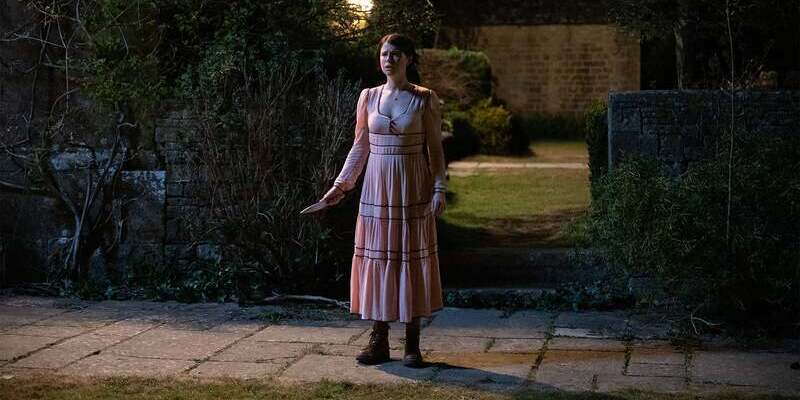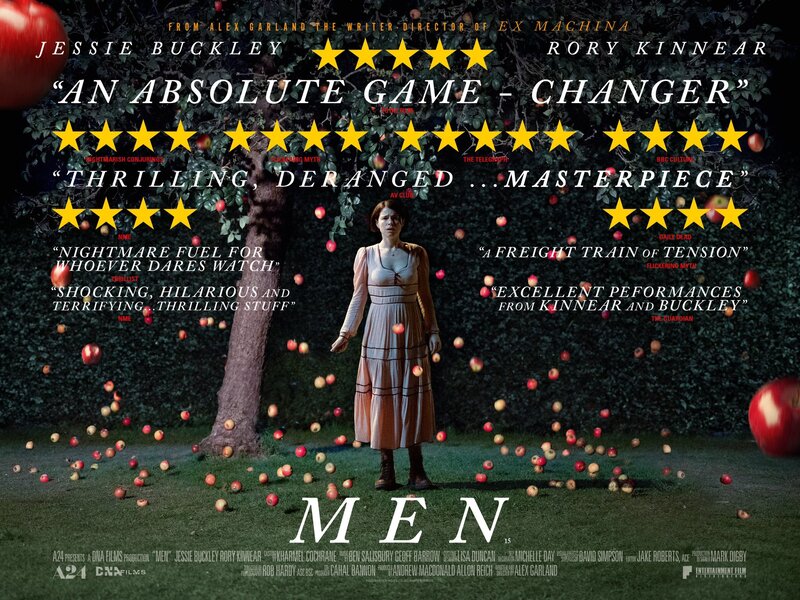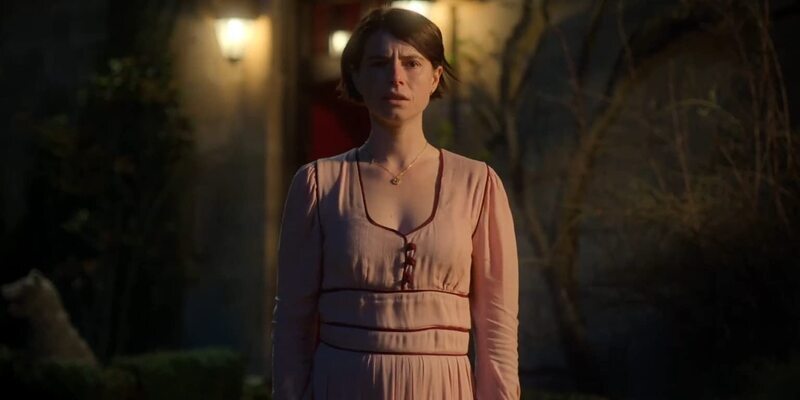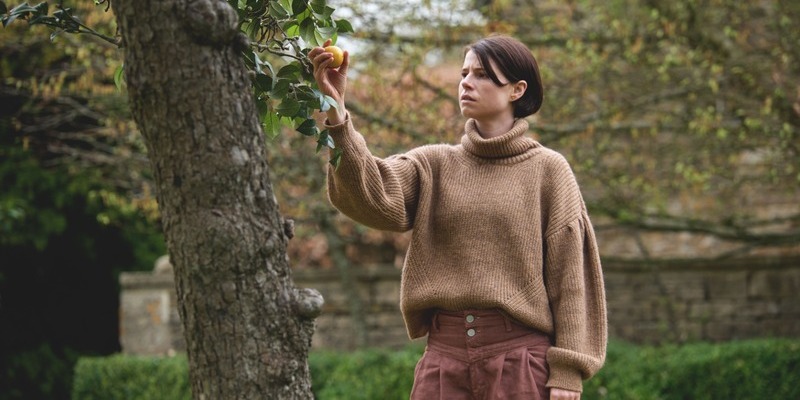
Review by
Eric Hillis
Directed by: Alex Garland
Starring: Jessie Buckley, Rory Kinnear, Paapa Essiedu, Gayle Rankin

Is there a woman alive who at some point in her life hasn't uttered the
refrain "Men are all the same"? In writer/director Alex Garland's
Men, all the men really are the same. They're all played by
Rory Kinnear. It's certainly an interesting choice, and it's easy
to see what Garland is getting at, but rather than having an eerie
effect it instead feels as though the film's female lead,
Jessie Buckley, is the human star of a Muppet movie, oblivious to
the unspoken fact that she's the only character not made of felt.
Buckley is Harper, a ridiculously wealthy (based on the implausible
location of her London apartment, the sort of residence only oil barons
and Premier League footballers could afford to rent) Irish woman who
heads to a seemingly idyllic village in the English countryside. Renting
a spacious yet quaint house for two weeks, Harper hopes to unwind and
get past the trauma she's been experiencing ever since her abusive
husband James (Paapa Essiedu) died after falling from the window
of their ridiculously expensive townhouse. Harper had asked for a
divorce, to which James responded by threatening to kill himself, and
she's left unsure as to whether his death was suicide or an
accident.

The first of Kinnear's incarnations we meet is Dick Emory lookalike
Geoffrey, the awkward but friendly owner of the home Harper is renting.
Later while out for a walk she finds herself followed by a naked man
covered in scars, who looks a lot like Geoffrey. After he tries to get
into her rented home, Harper calls the police, and the policeman who
responds is another Geoffrey clone, as is the local vicar, a young boy
and a couple of sinister Straw Dogs extras lurking in the
pub, whose landlord is also the spit of Geoffrey. This is never remarked
on by Harper, who makes several other observations about how odd the
area is in a series of Facetime calls with a female friend (Gayle Rankin) back in London.
Aside from Geoffrey, to different degrees all the men Harper encounters
treat her terribly. Opening up to the local vicar about being haunted by
James, the man of the cloth hints that she may have driven her hubby to
suicide. The young boy swears at her. The copper is useless. The
Straw Dogs extras try to break into her home (of course).
Meanwhile the naked man is slowly morphing into that popular pagan
figure The Green Man.

While initially intriguing, Men soon reveals itself as a
shallow attempt to replicate the unique atmosphere of 1970s folky gems
like Robin Redbreast,
Images
and Penda's Fen. It's the former that it most resembles, with its sophisticated urban
female protagonist encountering hostility in a rural setting, but that
movie was made for British TV on a miniscule budget and was forced to be
very subtle about its metaphors. Not so Men, which seems like a case of a movie overrun by its budget. The most
effective scenes in Men are those that consist simply of
two actors interacting, even if the dialogue is crudely on-the-nose and
the Kinnear gimmick is disruptive. When Screaming Mad George-style body
horror effects start to come into play the movie really goes off the
rails, and Garland has admitted himself that he didn't really know how
to wrap his movie up.
Garland doesn't seem to have given much thought to his casting. Making
his female lead Irish and dropping her into rural England should make
for a horror movie in itself but this dynamic isn't remotely addressed,
as though the character wasn't written as Irish until Buckley was cast.
The movie's "believe women" stance is made uneasy by having Harper's
abusive husband played by a black actor, given history's many examples
of white women lying about abuse at the hands of black men.

Men is another example of that increasingly tedious
sub-genre that's come to be known as "elevated horror," a snobby
classification that suggests regular horror is only of value to idiots.
Horror fans spent much of the past couple of decades moaning about
mainstream horror's reliance on jump scares, but the tropes of elevated
horror (slow zooms, screechy string scores, clunky metaphors) are just
as cheap and cynical as throwing a cat onto a piano. The people who make
these movies would likely say that they don’t just want to scare the
audience but to make the viewer think, but they're all so obvious in
their meanings that there's nothing to think about; the subtext
overwhelms the text and often becomes the key selling point. If
The Texas Chain Saw Massacre had been made by one of this
lot one of its characters would probably have remarked how rural Texas
was as hostile to outsiders as the jungles of Vietnam.


